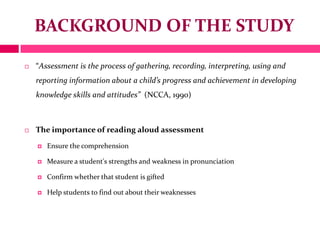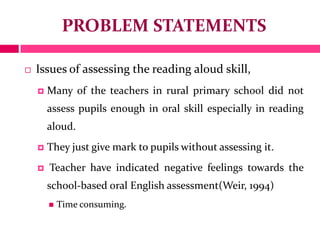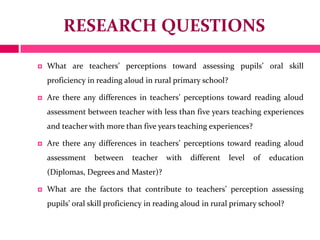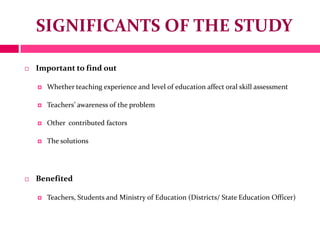My research proposal.ppt
- 1. EDU 702 RESEARCH METHODS IN EDUCATION RESEARCH PROPOSAL: TEACHER’S PERCEPTION ON ASSESING PUPIL’S ORAL SKILL (READING ALOUD) IN RURAL PRIMARY SCHOOL. NOORHANANI BT MAMAT @ MUHAMMAD (2012599003)
- 3. BACKGROUND OF THE STUDY Reading aloud A planned oral reading of a book or printed literary composition, usually related to a theme or topic of the learnt lesson (The Elementary Science Integrations Projects, 2010). Important Engage the student listener while developing background knowledge, Increasing comprehension skills, Fostering critical thinking.
- 4. BACKGROUND OF THE STUDY “Assessment is the process of gathering, recording, interpreting, using and reporting information about a child’s progress and achievement in developing knowledge skills and attitudes” (NCCA, 1990) The importance of reading aloud assessment Ensure the comprehension Measure a student's strengths and weakness in pronunciation Confirm whether that student is gifted Help students to find out about their weaknesses
- 5. PROBLEM STATEMENTS Issues of assessing the reading aloud skill, Many of the teachers in rural primary school did not assess pupils enough in oral skill especially in reading aloud. They just give mark to pupils without assessing it. Teacher have indicated negative feelings towards the school-based oral English assessment(Weir, 1994) Time consuming.
- 6. RESEARCH OBJECTIVES To investigate teachers’ perception on assessing pupils oral skill proficiency in reading aloud in rural primary school. To identify differences of teachers’ perception on assessing pupils oral skill proficiency in reading aloud in rural primary school in terms of teachers’ years of teaching experiences and level of educations. To explore factors that contributes to teachers’ perception on assessing pupils’ oral skill proficiency in reading aloud in rural primary school.
- 7. RESEARCH QUESTIONS What are teachers’ perceptions toward assessing pupils’ oral skill proficiency in reading aloud in rural primary school? Are there any differences in teachers’ perceptions toward reading aloud assessment between teacher with less than five years teaching experiences and teacher with more than five years teaching experiences? Are there any differences in teachers’ perceptions toward reading aloud assessment between teacher with different level of education (Diplomas, Degrees and Master)? What are the factors that contribute to teachers’ perception assessing pupils’ oral skill proficiency in reading aloud in rural primary school?
- 8. SIGNIFICANTS OF THE STUDY Important to find out Whether teaching experience and level of education affect oral skill assessment Teachers’ awareness of the problem Other contributed factors The solutions Benefited Teachers, Students and Ministry of Education (Districts/ State Education Officer)
- 9. LIMITATIONS OF THE STUDY Limitation in time and cost Study will be conducted in District Besut, Terengganu only Inadequate of English-option teacher Difficulties in contributing the questionnaires Samples’ readiness in participating
- 10. OPERATIONAL DEFINITIONS Oral skill Reading aloud Assessment Educational Assessment Perception
- 11. CHAPTER 2 : LITERATURE REVIEWS
- 12. LITERATURE REVIEWS Perceptions On Reading Aloud Perceptions On Assessment Reading Aloud In Oral Assessment Oral Assessment In Rural Primary School
- 14. RESEARCH DESIGN Descriptive case study Mixed Method Quantitative Method Design Information on the background of the samples; teachers’ experiences of teaching (< 5 years, 5 years or > 5 years) and their level of education (diploma, degree or master) Qualitative Method Design Information on teachers’ perspective
- 15. POPULATION AND SAMPLING Quantitative Cluster Random Sampling 80-120 samples from 30 primary school in Besut District, Terengganu Option-English teachers Qualitative Purposive sampling 12 samples Criteria- teaching experience (>5 years, 5 years, > 5 years) and level of teachers’ education (Diploma, Degree, Masters)
- 16. INSTRUMENTATIONS Quantitative data Questionnaire Form The participants’ (teacher) background on its years of teaching experience and their level of education Frequency on conducting the oral skill assessment and other skills’ assessment Qualitative data Interview Views, the experience, belief and/or motivation of the participants in specific manner regarding to their perspective on assessing oral skills especially in reading aloud
- 17. VALIDITY AND RELIABILITY Criterion-Related Validity. Concurrent validity Inter-rater reliability
- 18. DATA COLLECTION Questionnaire Form Submit to 30 school to get 80-120 samples Will be collected in fortnight With permission from the School Head of English Panitia Interview 12 samples in separate interview 15-20 minutes Semi-structured questions- Recorded by audio recorder tools
- 19. DATA ANALYSIS Quantitative data Compile the data on an Excel spreadsheet and SPSS. Interpret the data on answering each questions. Draw conclusions Qualitative Data Constant comparative method Use critical thinking to synthesize the data Examine the interviews for the teachers’ insights Utilize the data from the interviews to corroborate with the findings with other data sources.
- 20. Q & A Thank you for your attention…



















